The first monsoon showers bring the blooming season of wild flowers in Borivli national park for no longer than a fortnight. Enjoy these ephemeral beauties on a trail
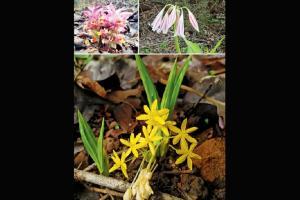
(Clockwise from top) Curcuma pseudomontana, called ran halad in Marathi; Crinum latifolium, also known as milk and wine lily; Curculigo orchioides is an endangered herb, popularly known as kali musli
After months of unrelenting heat, when the first drops of rain kiss the parched earth, the transformation that happens in nature is what poems are made of. The petrichor, the green blanket that envelopes the soil, and the visibly happier birds and insects are treats even an urban dweller holed up in a high-rise can enjoy. But what transpires in the forest, stays in the forest. Fortunately, Mumbaikars can witness this rejuvenation in the jungle within the city limits — the Sanjay Gandhi National Park.
ADVERTISEMENT
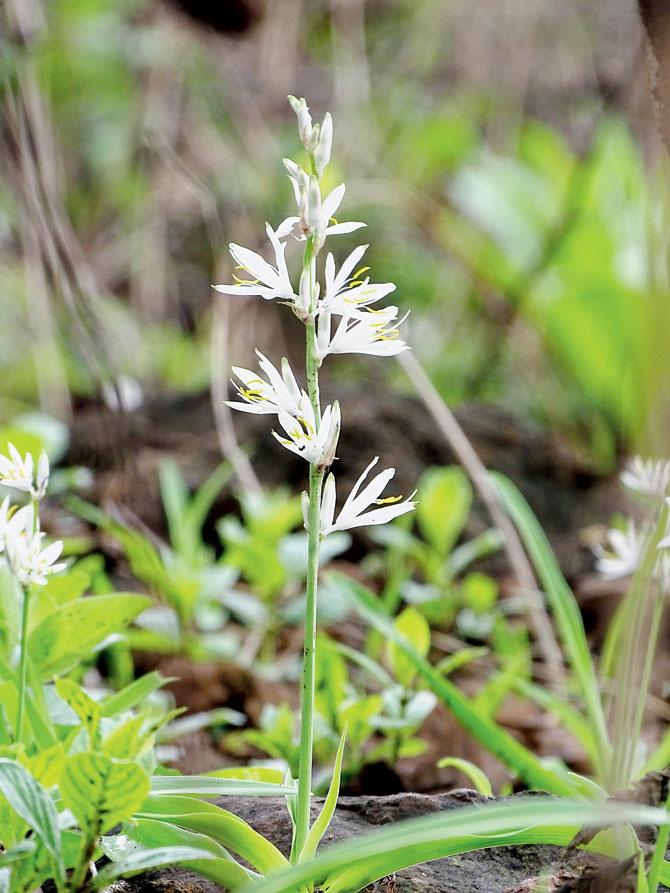
Chlorophytum borivilianum
"A phenomenon specific to the fortnight following the first monsoon showers is the blooming of wild flowers on and near the rocky outcrops of the Kanheri Caves area in the national park, which wither away in a week or two. Found in isolated habitats, these plants survive in adverse conditions. They have medicinal properties and are also consumed as vegetables, but urban residents are increasingly moving away from this connect with nature. It was to rekindle this bond that we started the wild flower trail last year," explains Dr Rajdeo Singh, a botanist with the Bombay Natural History Society, who will lead a trail at SGNP this Sunday.
Dr Singh tells us about some of these ephemeral beauties you are likely to spot on the three-hour long trail.

Dr Rajdeo Singh
Borivli local
First described from the Sanjay Gandhi National Park, Chlorophytum borivilianum's nomenclature is an ode to one of the regions in India it is endemic to. Popularly called safed musli, it is a small herb with finger-like tuberous roots and linear leaves lying flat on ground. The white flowers grow in dense elongated clusters. While its leaves are used as wild vegetables, the tubers' extensive extraction from the wild for their aphrodisiac properties has resulted in the plant's Critically Endangered IUCN status.
Another plant found originally on the rocky surface above the Kanheri Caves is Dipcadi saxorum. It belongs to the onion family and has lily-like linear leaves, and white flowers arranged in a long stalk.
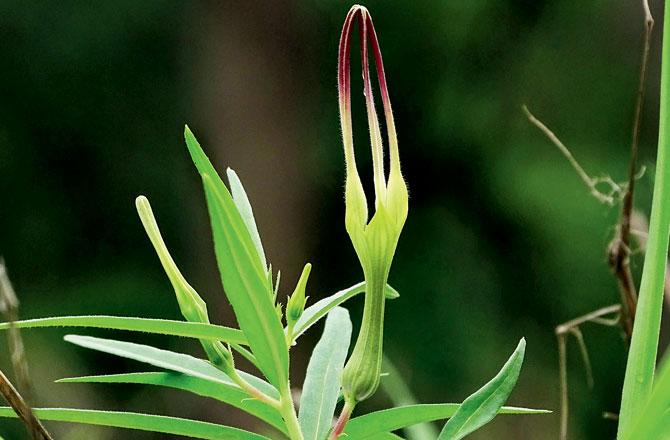
Ceropegia attenuata
Flowers for the gods
Ceropegia attenuata (sada khantudi in Marathi) belongs to the milkweed family. Its flowers are offered to Lord Hanuman in the northern stretch of the Western Ghats — from southern Gujarat to northern Goa — the region it is endemic to. A small tuberous herb with linear leaves, its flowers resemble a fountain of wax — an adaptative feature that helps the species withstand rains, as the water drips away.
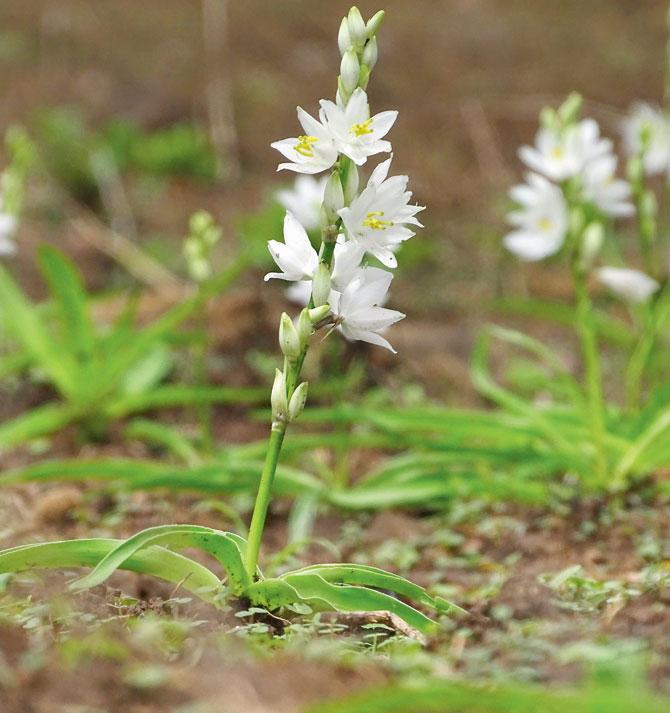
Chlorophytum tuberosum
Veggie delight
Also known as safed musli, Chlorophytum tuberosum is a small herb with tuberous roots, and linear leaves, which are used as wild vegetables. Its white flowers grow in dense elongated clusters. Another flowering plant consumed as a vegetable is the Amorphophallus commutatus or dragon stalk yam. Popularly called shevale, it comprises cylindrical spikes with flowers and a coloured leaf, much like anthuriums. The spikes are commonly collected by tribals to make a sabzi, which is also a hat-tip to sound indigenous knowledge. For, the calcium oxalate crystals in the flowers can cause itching. To dissolve these crystals, shevale bhaji is always cooked with kokum or tamarind.
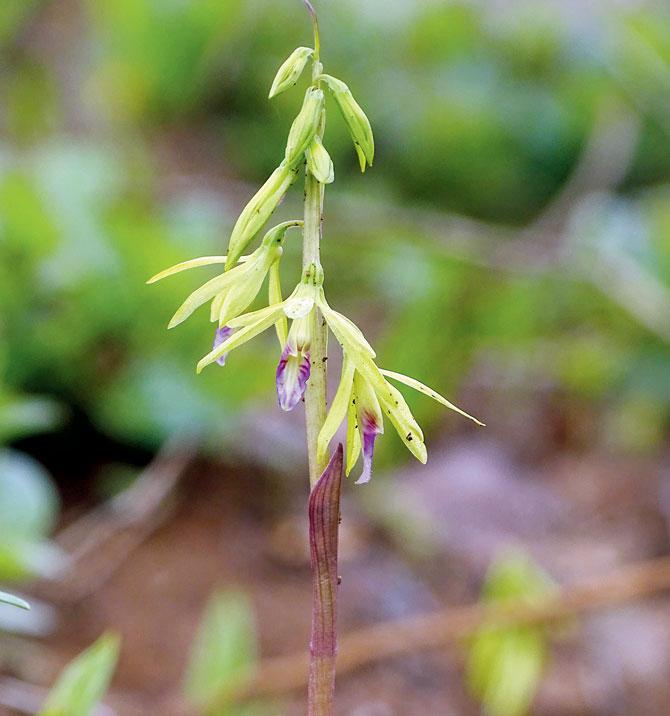
Nervilia aragoana
Annual storage
Locally known as sada khantudi, Ceropegia attenuata belongs to the milkweed family. Among the first to bloom on the forest floor during pre-monsoon showers, Nervilia aragoana or duduki's life cycle involves flowering, followed by fruiting and leafing. The terrestrial tuberous orchid stores its food for the rest of the year in its underground tuber. The greenish unisexual flowers feature one variegated petal to attract insects, and have an inbuilt guiding pattern to ensure successful pollination.
On June 23, 8 am
At Main gate, Sanjay Gandhi National Park, Borivli East.
Call 9969798447
Cost Rs 1,000
Catch up on all the latest Mumbai news, crime news, current affairs, and also a complete guide on Mumbai from food to things to do and events across the city here. Also download the new mid-day Android and iOS apps to get latest updates
 Subscribe today by clicking the link and stay updated with the latest news!" Click here!
Subscribe today by clicking the link and stay updated with the latest news!" Click here!






